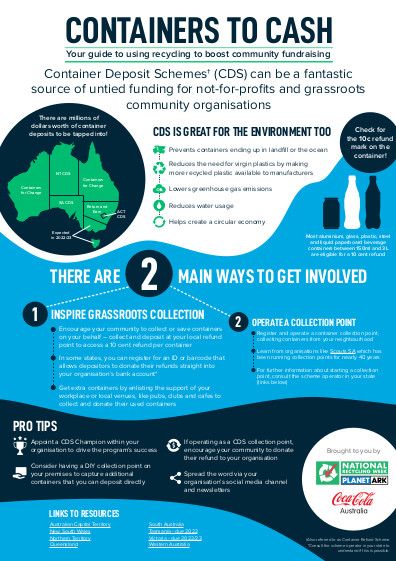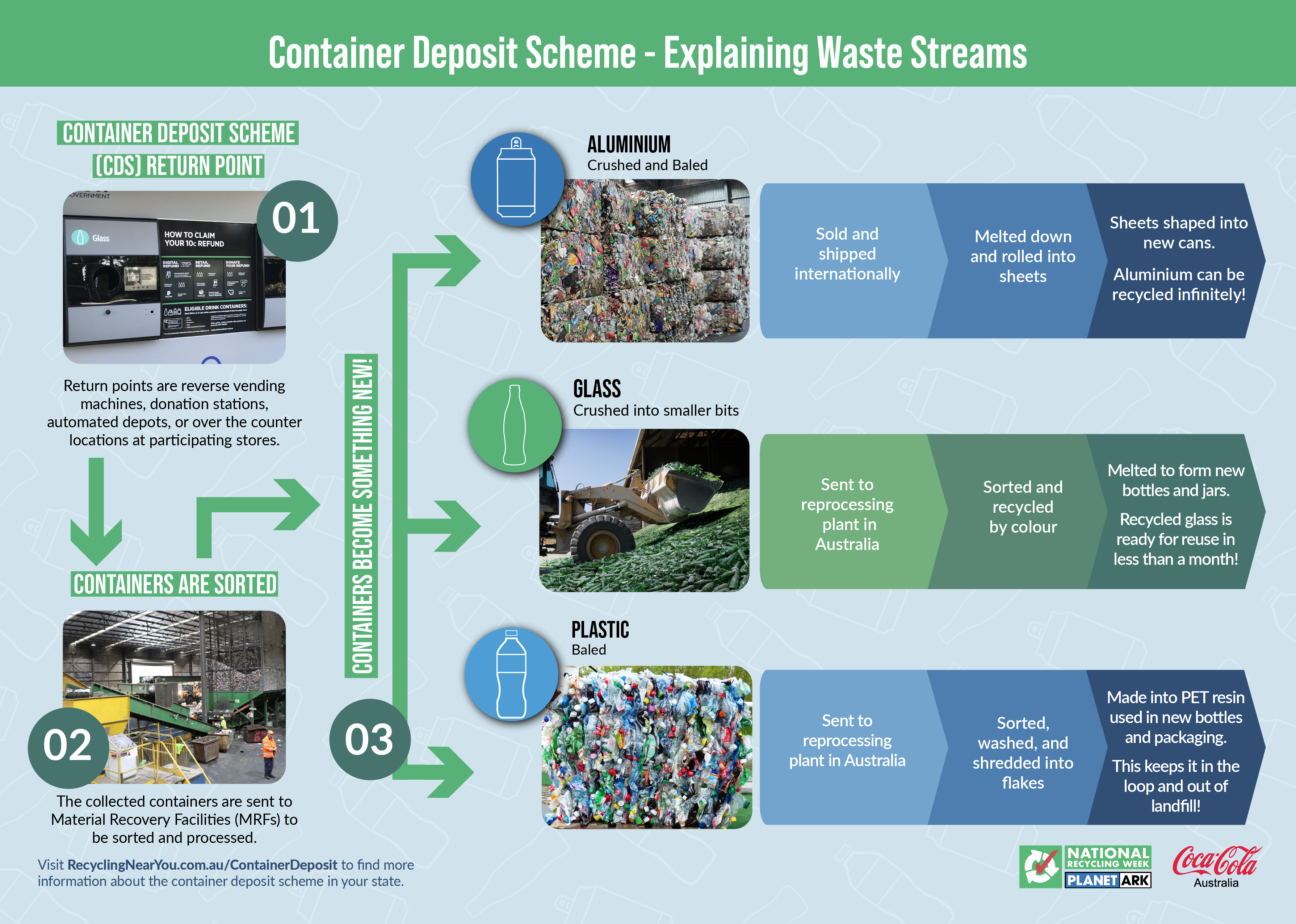New South Wales
The NSW container deposit scheme, Return and Earn, commenced across NSW on 1 December 2017.
What's Covered?
Most drink containers between 150ml and 3L that display a NSW CDS label can be returned.
From the commencement of the scheme in NSW all beverage suppliers and retailers must sell eligible beverage containers that display the required EPA approved CDS labelling, to be developed in the coming months.
What's Not Covered?
- Plain/unflavoured milk (or milk substitute) containers (cartons, glass or plastic)
- Flavoured milk containers 1 litre or more
- Pure fruit or vegetable juice containers 1 litre or more
- Glass containers for wine and spirits
- Casks (plastic bladders in boxes) for wine and casks for water - 1 litre or more
- Sachets for wine 250ml or more
- Containers for cordials, concentrated fruit/vegetable juices
- Registered health tonics
As the primary aim of the program is to reduce litter, containers for drinks that are usually consumed at home, like wine bottles and milk and juice cartons, aren't covered, although they can be recycled in kerbside systems as usual. Search RecyclingNearYou to find out if your council accepts them.
Who is it funded by?
Beverage suppliers (manufacturer, importer, wholesaler or retailer) that bring eligible containers into NSW will be responsible for funding the 10-cent refund as well as associated costs.
Councils will receive the refund for drink containers that end up in kerbside recycling bins, which will go to improving their waste services and reduce the cost of waste collections.
Where are the collection points?
The Network Operator is responsible for delivering statewide coverage through a network of collection depots and reverse vending machines. The full list of collection points will be available on the Return and Earn website.
For more information about the NSW container deposit scheme visit the Return and Earn and NSW EPA website.
Northern Territory
The Northern Territory launched its scheme in 2011.
What's Covered?
- Carbonated soft drinks, 3L or less
- Non-carbonated, soft drinks: including (but not limited to) fruit/juice based drinks (containing less than 90% juice), 'sports' drinks, 'vitamin' drinks, 'energy' drinks, ready to drink cordials, 3L or less
- Pure fruit/vegetable juice: means a liquid at least 90% of which is fruit juice and/or vegetable juice.
- Flavoured milk, less than 1L
- Water: plain, still or carbonated spring water, mineral water and any other water intended for human consumption, less than 1L
- Beer, cider and mixed drinks, 3L or less
- Wine in plastic or sachets, less than 250ml
- Wine in casks, less than 1L
What's Not Covered?
- Unflavoured milk (cartons, glass or plastic)
- Concentrated fruit and/or vegetable juice intended to be diluted before consumption
- Health tonic included on the Australian Register of Therapeutic Goods
- Cordial (undiluted)
- Glass wine and spirit bottles
See the full list of what's covered
Search RecyclingNearYou to find out what is accepted in your kerbside collection.
Who Is It Funded By?
Beverage suppliers that bring eligible containers into the NT will be responsible for funding the 10-cent refund as well as associated costs.
Where Are The Collection Points?
See the full list of collection points in the Northern Territory.
Community Education Resources
Encourage your community to participate in the NT CDS with our free posters, digital graphics and factsheet.
South Australia
The South Australian scheme, running since 1977, has resulted in an 80% return rate of containers and saw charities and community groups raise $60 million last year through clean-up projects.
The container deposit scheme also provides a financial benefit to community groups, sporting clubs and charities that collect empty containers for refund. In 2012-13 nearly $60 million was refunded to the community.
What's Covered?
- Carbonated soft drinks, 3L or less
- Non-carbonated, soft drinks: including (but not limited to) fruit juice based drinks (containing less than 90% juice), 'sports' drinks, 'vitamin' drinks, 'energy' drinks, ready to drink cordials, 3L or less
- Water: plain, still or carbonated spring water, mineral water and any other water intended for human consumption, less than 1L
- Pure fruit/vegetable juice: means a liquid at least 90% of which is fruit juice and/or vegetable juice, less than 1L
- Flavoured milk: less than 1L
- Beers, cider and mixed drinks, 3L or less
- Spirits: a liqueur or other alcoholic beverage produced by distillation (eg: brandy, gin, rum, vodka, whisky), 3L or less, non-glass only
- Wine in plastic or sachets, less than 250ml
- Wine in casks, less than 1L
What's Not Covered?
- Unflavoured milk (cartons, glass or plastic)
- Concentrated fruit and/or vegetable juice intended to be diluted before consumption
- Health tonic included on the Australian Register of Therapeutic Goods
- Cordial (undiluted)
- Glass wine and spirit bottles
For a full list see the SA EPA website.
Search RecyclingNearYou to find out what is accepted in your kerbside collection.
Who Is It Funded By?
Beverage suppliers that bring eligible containers into SA will be responsible for funding the 10-cent refund as well as associated costs.
Where Are The Collection Points?
For a full list of collection points, please visit the SA EPA website.
Queensland
Queensland's container refund scheme commenced 1 November 2018.
The scheme provides social enterprise, community, and regional and remote area benefits by creating new job and recycling opportunities. It also provides recycling opportunities for communities that do not currently have access to kerbside recycling services.
What's Accepted?
Most aluminium, glass, PET, HDPE, steel and liquid paperboard beverage containers between 150ml and 3L will be eligible under the scheme. As of 1 November 2023, glass wine bottles and spirit bottles are accepted.
After a period of transition, all eligible containers will also be required to display a refund marking that will make it easy for people to see which containers can be returned for a refund.
What's Not Accepted?
- Plain milk containers
- Large containers (1L or more) that have contained flavoured milk, pure juice, cask wine or cask water
- Cordial or vegetable juice containers
- Sachets above 250ml that have contained wine
- Registered health tonics
Search Recycling Near You to find out what is accepted in your kerbside collection.
Who Is It Funded By?
Beverage suppliers that bring eligible containers into QLD are responsible for funding the 10c refund as well as associated costs.
Where Are The Collection Points?
There are already 230 container refund points across Queensland with more coming on line soon. These container refund points may operate on a permanent, temporary or mobile basis.
For further updates on the scheme visit:
https://www.containersforchange.com.au
Western Australia
Western Australia's Containers for Change scheme launched October 1, 2020.
What's Covered?
Consumers will be able to get a 10 cent refund on all eligible beverage containers - plastic and glass bottles, paper-board cartons, and steel and aluminium cans between 150 millilitres and three litres. Examples of eligible beverage containers include:
- Soft drink cans and bottles
- Bottled waters - both plastic and glass
- Small flavoured milk drinks
- Beer and cider cans and bottles
- Sports drinks and spirit-based mixed drinks.
Further Information
For more information, please email your request to cds@dwer.wa.gov.au or visit the Containers for Change website.
Tasmania
Due to start in 2023, the statewide Container Refund Scheme (CRS) will be known as Recycle Rewards, which aims to reduce litter while supporting the development of our circular economy by increasing recycling.
What's Covered?
Eligible containers are typically those that are between 150ml and three litres such as:
- cans (e.g. soft drink)
- bottles (both glass and PET)
- cartons (e.g. flavoured milk)
- juice boxes/poppers
What's Not Covered?
Ineligible containers include:
- milk containers (plain or flavoured 1 litre or more)
- wine bottles
- spirit bottles
- juice bottles over one litre
- cordial bottles
Who is it funded by?
The beverage industry will fund the container refund scheme. This is a form of 'product stewardship', where the manufacturer takes greater responsibility for its packaging after it has been sold, helping to improve recycling rates and decrease litter.
Where are the collection points?
The network will have more than 40 refund points including in every city and on King Island and Flinders Island. There will be large depot collection points and reverse vending machines in the major population centres, as well as over-the-counter refund points in small businesses.
More information about the collection points will come as the scheme is developed.
For more information, visit the Tasmania Government's website.
Australian Capital Territory
The ACT container deposit scheme, commenced across the ACT on 30 June 2018.
The ACT Container Deposit Scheme (ACT CDS) encourages recycling in the community while reducing litter and the number of containers going to landfill.
Under the Scheme, you can return eligible, empty beverage containers to return points and receive a 10 cent refund for each container. You can choose to keep your refund or donate it to charity.
What's Covered?
Eligible containers are ones that are commonly found in the litter stream, including most glass, PET, HDPE, aluminium, steel or liquid paperboard (cartons) between 150mL and 3L in size. All containers that can be recognised as an eligible container will be accepted.
What's Not Covered?
- Plain/unflavoured milk (or milk substitute) containers (cartons, glass or plastic)
- Flavoured milk containers 1 litre or more
- Pure fruit or vegetable juice containers 1 litre or more
- Glass containers for wine and spirits
- Casks (plastic bladders in boxes) for wine and casks for water - 1 litre or more
- Sachets for wine 250ml or more
- Containers for cordials, concentrated fruit/vegetable juices
- Registered health tonics
As the primary aim of the program is to reduce litter, containers for drinks that are usually consumed at home, like wine bottles and milk and juice cartons, aren't covered, although they can be recycled in kerbside systems as usual. Search RecyclingNearYou to find out if your council accepts them.
Who Is It Funded By?
Beverage suppliers (manufacturer, importer, wholesaler or retailer) that bring eligible containers into ACT will be responsible for funding the 10-cent refund as well as associated costs.
Where Are The Collection Points?
We've got convenient and accessible return points across the ACT and are planning on opening more soon. By July 2019 there will be 18 return points in operation.
For more information about the ACT container deposit scheme visit the ACT Government CDS site
Victoria
The Victorian container deposit scheme, titled CDS Vic, launched on 1 November 2023.
What's Covered?
Most aluminium, glass, plastic, and liquid paperboard (carton) drink containers between 150ml and 3 litres are eligible. Keep the lids on, as they will be recycled as well.
The scheme accepts:
- plastic soft drink bottles
- glass beer bottles
- soft drink and alcohol sold in aluminium cans
- small fruit juice cartons
- Flavoured milk containers
What's Not Covered?
The scheme does not include::
- plain milk containers
- flavoured milk containers 1 litre or more
- wine bottles
- spirit bottles
- cartons under 150ml
- containers 1 litre or more that contained flavoured milk, pure fruit or vegetable juice, cask wine or cask water
- cordial or syrup containers
- health tonics and probiotics
- large beverage pouches such as bags of wine
Who is it funded by?
The scheme is run by VicReturn (scheme coordinator) and Return-it, TOMRA Cleanaway, and Visy (network operators). Like all Australian container deposit schemes, beverage suppliers will fund the scheme. This is a form of 'product stewardship', where the manufacturer takes greater responsibility for its packaging after it has been sold, helping to improve recycling rates and decrease litter.
Where are the collection points?
There will be many locations across Victoria to return eligible containers including shops, reverse vending machines, depots, pop-ups, and drop-off points. These will be run by recyclers, small businesses, charities, and community and sports groups.
To find a CDS location and for more information, visit CDS Vic.



